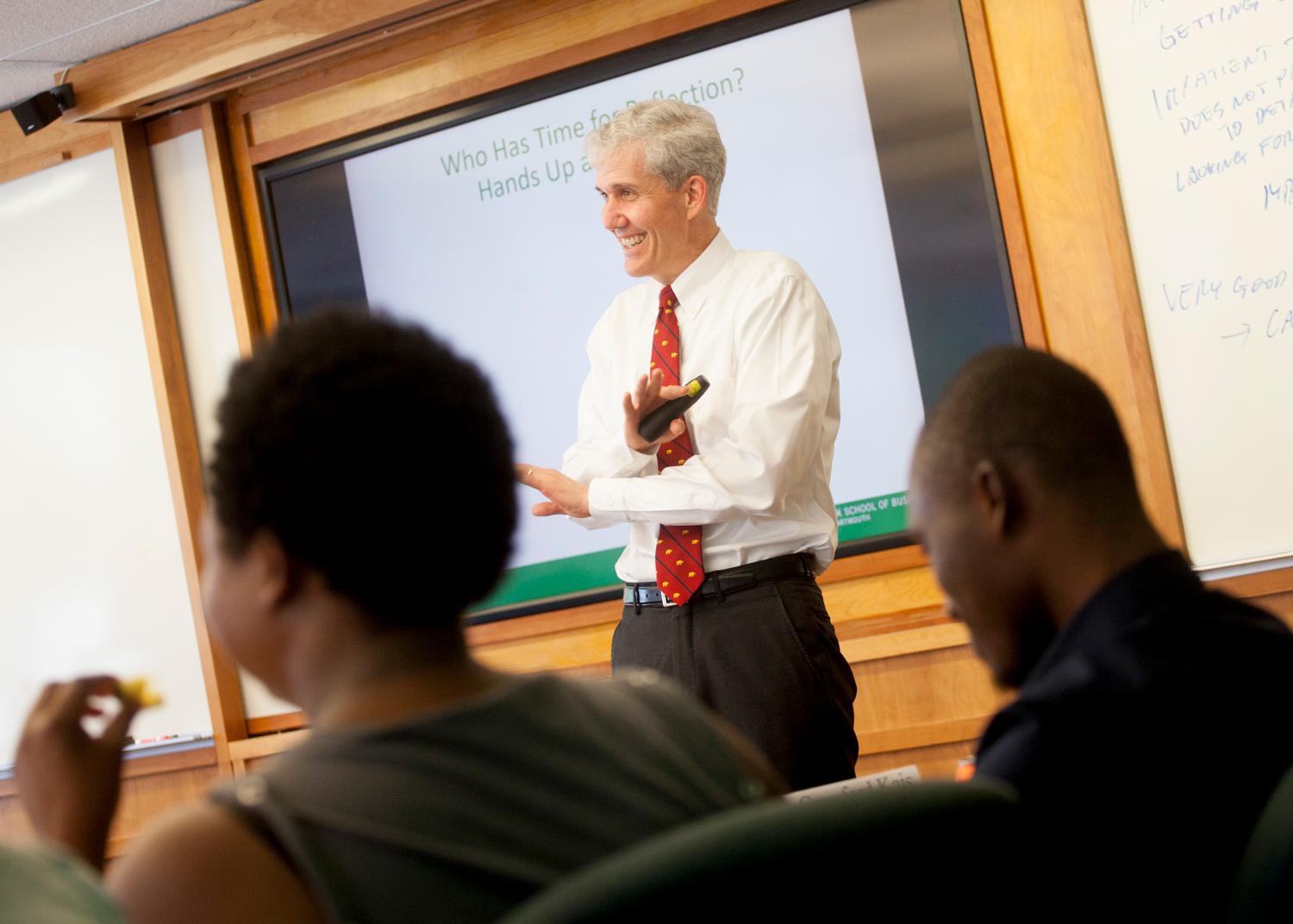Matthew J. Slaughter, the Paul Danos Dean of the Tuck School of Business, has been appointed to a third four-year term, Provost David Kotz D’86 announced today.
I have been privileged to work closely with Matt throughout the years and to experience the commitment and energy he brings both as dean of Tuck and as a leader for the institution,
says Kotz. His optimism and drive to innovate are inspiring. He is deeply devoted to strengthening the Tuck School.
Slaughter, the Earl C. Daum 1924 Professor of International Business and an expert on the political-economy of globalization, has served as dean of the Tuck School since 2015. His third term begins July 1.
It remains a great honor to serve as dean. The Tuck community is unlike any other. Each day, I get to partner with remarkable faculty, students, staff, and alumni to create experiences that are truly personal, connected, and transformative. Thanks to this total team effort, we have built a lot of momentum. Over the next four years, we will harness this momentum to create even more of the trust-based, data-informed, 21st-century learning that our world is seeking,
says Slaughter. I am excited about what is to come.
I get to partner with remarkable faculty, students, staff, and alumni to create experiences that are truly personal, connected, and transformative. Thanks to this total team effort, we have built a lot of momentum. Over the next four years, we will harness this momentum to create even more of the trust-based, data-informed, 21st-century learning that our world is seeking.
—Matthew J. Slaughter
In his first term as dean, Slaughter refined the mission and strategy for the school, which framed broadscale changes to the MBA program’s core curriculum and created a process for ongoing innovation. The school formalized its suite of signature TuckGO courses and made global learning a requirement of its MBA. He led the strategic expansion of Tuck’s portfolio of nondegree programs, launching the Next Step program for military veterans and elite athletes; a December session of Business Bridge, a program for liberal arts undergraduates; and TuckLAB, a business-focused offering for Dartmouth undergraduates. Tuck Executive Education also overhauled its flagship program for senior executives (the Advanced Management Program) during his first term.
Slaughter’s second term as dean advanced the Tuck School in the face of historic circumstances. Under his leadership, the school safely navigated the COVID-19 pandemic by leveraging its experience with distance learning from the Master of Health Care Delivery Science program and making capital investments across its classrooms for the technology to pivot programs to fully virtual or hybrid formats when needed. Tuck never wavered from its transformative aspirations—and Slaughter led a community, that with grit and grace, rallied and delivered.

Prior to assuming the deanship, Slaughter was associate dean for faculty and founding faculty director of Tuck’s Center for Global Business and Government.
With Slaughter at the helm, Tuck Executive Education embraced new online partnerships to expand its reach, and the school’s Diversity Business Programs celebrated 40 years. Slaughter also restructured the deans’ team to better meet the school’s aspirations, appointing new deans for diversity, equity, and inclusion; for administration and finance; and for marketing and communications. These new roles helped deliver Tuck’s first-ever DEI strategic review and action plan, strengthen its finances, and expand its global presence.
Throughout his tenure as dean, Slaughter has remained focused on building the faculty of the future, welcoming renowned scholar-educators across Tuck’s research areas and recruiting experienced executives to share their insights as adjunct and clinical faculty. Faculty continue to produce widely acclaimed research that blends rigor and relevance, and they continue to drive curricular innovation. Just this academic year, the school introduced two new types of elective courses to its MBA curriculum—Tuck Sprints and Tuck Practicums—that are already enriching classrooms.
To help deliver on Tuck’s mission, Slaughter and his team continue to break fundraising records. In 2022, Tuck surpassed the $250 million goal set for the Tuck Difference, part of Dartmouth’s Call to Lead Campaign. To date, the school has raised $331 million, which includes the largest gift pledge in school history: a $52.1 million anonymous gift that will fund a recurring Dartmouth-wide summit convening students, scholars, and global leaders to address pressing issues at the intersection of health, wealth, and sustainability. Integral to Tuck’s advancement success remains Tuck Annual Giving, with participation rates that remain unrivaled.
Matt’s steady leadership and bold vision for the future have been incredibly important to Tuck’s success. … We are deeply appreciative for all Matt has done and will continue to do for Tuck.
—Michael Ward T’92
Matt’s steady leadership and bold vision for the future have been incredibly important to Tuck’s success since he first assumed this role in 2015,
said Michael Ward T’92, chair of the Tuck Board of Advisors. We are deeply appreciative for all Matt has done and will continue to do for Tuck.
Prior to assuming the deanship, Slaughter was associate dean for faculty and founding faculty director of Tuck’s Center for Global Business and Government. He had also previously served as associate dean of the MBA program. From 2005 to 2007, Slaughter served on the Council of Economic Advisers in the Executive Office of the President of the United States. He joined the Tuck faculty in 2002. From 1994 to 2001, he taught Dartmouth undergraduates as a member of the faculty in the Department of Economics.
Slaughter is a member of the American Academy of Arts and Sciences, a life member of the Council on Foreign Relations, a research associate at the National Bureau of Economic Research, a member of the Aspen Institute’s Economic Strategy Group, and an academic advisor to the McKinsey Global Institute. He received his bachelor of arts in economics from the University of Notre Dame in 1990 and his PhD in economics from the Massachusetts Institute of Technology in 1994.

